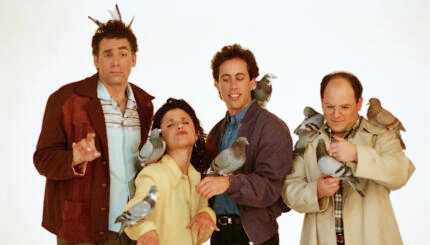Today is author Don DeLillo’s 70th birthday. Sure, he’s not Jewish and — as far as I can remember — has written only one significant Jewish character (Murray Siskind from White Noise), but he’s one of America’s great novelists — and probably my favorite — so I thought the occassion worth noting.
Interestingly, DeLillo was the first American writer ever to receive the Jerusalem Prize, awarded biennially at the Jerusalem International Book Fair to an author whose work promotes the “idea of the freedom of the individual in society.” Previous winners include Bertrand Russell, Borges, Simone de Beauvoir, and V.S. Naipaul. (Incidentally, the two award recipients after DeLillo were both American and both Jewish: Susan Sontag and Arthur Miller.)
My column in next weekend’s Jerusalem Post will include a more detailed Happy Birthday summary of DeLillo’s career and significance, and I’ll post a link to it when it’s published. In the meantime, after the jump, I’ve pasted an article I wrote for the Post a couple of years ago for the 20th anniversary of White Noise.
Still reverberating
By Daniel Septimus
From the JERUSALEM POST (February 4, 2005)
“It’s about fear, death, and technology. A comedy, of course.”
These are the words of Don Delillo, speaking in 1984 a few months before the publication of White Noise — for my money, the greatest American novel of the past quarter century. The quote is aptly descriptive, but it also captures the essential pathos of White Noise: its grandeur, its insight, its humor, and most subtly, its humanity.
Don Delillo was an important novelist before he published White Noise. His first novel Americana was released in 1971. In it, Delillo exhibited many of the characteristics that have made him one of the most important — if not most read — contemporary writers. Delillo’s subject, in this first novel and thereafter, is America with all its unique pathologies. Delillo’s books are genuinely dark, but they are also genuinely funny. He is smart — perhaps too smart sometimes — and his prescience is uncanny. Americana foreshadowed the rise of reality TV, while Mao II (1991) presaged the intricate relationship between terrorism and television.
But Delillo can be didactic at times, and though he writes sentences that make the art of sentence writing seem as fresh as the latest Macintosh, few of his stories hold up as novels. Though his characters are intelligent, funny, and articulate they often sound alike — like mouthpieces for their creator.
And then there’s White Noise, the novel in which all of Delillo’s talents fell mystically into place, the only Delillo novel to win a National Book Award, and perhaps most impressive, the novel that Michiko Kakutani — the notoriously critical book reviewer for the New York Times — named the novel from the late 20th century most likely to be read and cherished in 100 years.
White Noise tells the story of Jack Gladney, a professor of Hitler Studies at the College-on-the-Hill, a generic academic institution in Middle America. He lives with his ironically and prototypically American family, his fifth wife Babette and the four children produced by their various marriages. Jack is respected by his colleagues and in love with his wife, but domestic and professional bliss is shattered by the appearance of a black cloud — the Airborne Toxic Event as it is called — which erupts over the town, possibly contaminating Jack and sentencing him to a premature death.
All of Delillo’s works are intelligent, but in White Noise Delillo resists the inclination to narrate his philosophical musings and instead embeds them into the story. Most impressively, the intellectual currents tackled in White Noise were so cutting edge when the book was published that they’re almost as novel today as they were twenty years ago.
Many ideas in White Noise parallel the thought of the French philosopher Jean Baudrillard. According to Baudrillard, we live in an age of simulation and hyperreality. The real, the true, is all but extinct. Â In a hilarious scene in White Noise, Delillo riffs on this notion, introducing us to SIMUVAC, a team of workers who simulate catastrophes and evacuations. SIMUVAC appears several times during the novel, but the most ironic and theoretically significant scene occurs when Jack speaks to a SIMUVAC employee after being exposed to the Airborne Toxic Event.
"That's quite an armband you've got there. What does SIMUVAC mean? Sounds important."
"Short for simulated evacuation. A new state program they're still battling over funds for."
"But this evacuation isn't simulated. It's real."
"We know that. But we thought we could use it as a model."
"A form of practice? Are you saying you saw a chance to use the real event in order to rehearse the simulation."
"We took it right into the streets."
According to Baudrillard, the proliferation of media has catapulted us into the age of simulation and the depths of the hyperreal, and the world of White Noise is a world that is both animated and deadened by electronic media. Even the most intimate moments are shared with a third character: television. As Babette and Jack lie in bed, Babette joking about the erotic fiction that they read, Jack begins “to feel an erection stirring. How stupid and out of context. Babette laughed at her own lines. The TV said: ‘Until Florida surgeons attached an artificial flipper.'”
For both Baudrillard and Delillo, however, media is more than just the fabric of our reality; it is the fabric of our selves. When the Airborne Toxic Event occurs, Jack’s daughters begin suffering from whatever symptoms are announced on the radio. In order to mitigate the symptoms, Babette suggests they turn the radio off.
Our interaction with television images perhaps best demonstrates the ramifications of our simulated world, a world where meaning, truth, and causation is elusive. Television news coverage, which purports to convey facts about reality, may be the most egregious such medium.
Examine this description of the Iraq war, published in the New York Times on April 3, 2003.
With the war rolling ahead on television, you the viewer are made a part of the invading army. Even the local meteorologists participate in the illusion. They give two weather reports: sunshine in New York, sandstorms in Basra.
Meanwhile, just as the audience feels a part of the army, the army becomes part of the audience. American troops on an aircraft carrier watch CNN to see how the war is playing and progressing. Soldiers are watching other soldiers on television.
That is, there is general confusion as to who is acting and who is watching. And at the crux of the confusion are the traditional eyewitnesses to war, the journalists, "embedded" with the troops. Are the television cameras the witnesses to war, or are they part of the weaponry? Or both?
Citizens watch the war on television. Citizens are polled about their feelings about the war, feelings that are filtered through hours of television watching. Those polls are broadcast on television, seen by politicians who then plan the war and their spin of the war. The soldiers fight the war, as other soldiers — who are about to fight the war — watch on television, an image broadcast all over the world for citizens and politicians to see. The process comes full circle. Where is the causation? Where is the truth? Where is the real?
One need not understand or even be aware of all these ideas to enjoy White Noise. It has many layers of meaning, but its density does not detract from its ability to engage and entertain. Indeed, what ultimately distinguishes White Noise from Delillo’s other novels is neither its brilliance, nor its style, but its humanity. Delillo described White Noise as a novel about fear, death, and technology. Death and technology are the subject of many of his books, but fear may be unique to White Noise. Jack Gladney is an emotional character. He feels—love, pride, jealousy, and also fear. Jack Gladney has heart.
Twenty years after White Noise was published, that heart is still beating.



